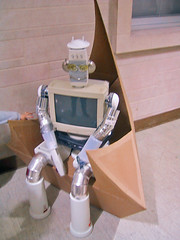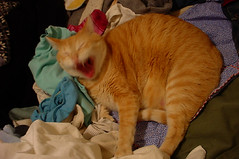Pleasing Ms. Therapy
I'm off the Lexapro completely now. Still taking barley grass which, the internets tell me, facilitates the carrying of the toxins (antidepressants) from their dispersed locations to the liver, which removes them.
I'm also eating some sushi. I'm a strict vegetarian who 85% of the time cooks vegan. Following Peter Singer's lead (among others), I am against the eating of fish even more than I am against the eating of free-range organic eggs. I, like random Peta members who saw the show, was appalled by that clip before the election where President Bush went on a local fishing show in Texas (!), then threw a live fish to his dog, Barney, explaining that he always likes to give Barney a fish! A live fish. For Barney to kill. On the air.
In spite of this, my old love of sushi, fine sushi, has snuck back in via the same ethical compartmentalization that allows me to wear leather boots as long as they're REALLY, REALLY cute. Or at least practical. My ethics appear therefore to be based largely on pleasure. It gives me great pleasure to avoid meat and to fancy up vegetables with my hard-won cooking skills. It gives me pleasure to cook quinoa, partly because of the name and because of the self-satisfaction of being SO KNOWLEDGABLE and cooking SUCH AN OLD GRAIN with SO MANY VITAMINS in it. It gives me great pleasure not to eat things that were, well, alive, running around squealing or looking kind of like my pets, and are now dead, the casual brutality of meals.
However, it gives me also great pleasure to wear great boots and to eat sushi. It would thus appear that the pleasure of zapping my brain with pure protein outweighs the pleasure of not eating, well, dead fish. Murdered fish!
The first time I ate sushi was in, of course, New York City; I was nineteen or twenty years old and I was in love. The city was full of lights. Inside the sushi restaurant was dim and like a cave. Friends explained to me how to order, how to eat. When we left the restaurant, my head felt amazing, supercharged, full of wit and energy and light!
Since then I've believed sushi helps my brain, so hey. The Omega-3s and all. Carefully attending to my body's physiology, I really experience well-being when my diet contains some sushi. Which is now available at my favorite local co-op, so it's cool, brought at least somewhat into proximity with the experience of organic produce and bulk grains.
I began this post to write about my therapy appointment yesterday.
The therapist is supposed to be helping me with the transition from medicated to not. She's supposed to help me monitor changes in my mood, help me deal with any issues that "come up."
Yesterday I wasn't in the mood to go to the therapist. I like her, I just didn't really feel like trying to put numbers on my days (on a scale of 1 to 10, what was today?), trying to match my selves up with her diagnoses, like cutting out fabric in the shape of Sew Easy! patterns.
Plus, I was a little down, partly because CV, who has a ton of work right now, was a little down. Plus my appointment was in the morning, instead of the afternoon. Morning is too early.
So I went in and talked -- you'll be surprised to learn that I am never unable to talk about myself -- and Therapist listened with her eyes very focused on my face. She was not as smiley as last week (when she told me that I am enthusiastic and fun to be around ), which seemed to me partly because she herself was having a harried day (she was 10 minutes late fetching me for my appointment), but I suspect was also a conscious attempt to take her cue from the client.
My therapist is young and pretty. She is old enough to have a bit of gravity and calmness and presence. But young enough so that it can feel like she's consciously calling up charts and lists as I talk, to compare me to.
We wandered a bit. I have a tendency to explain everything via longish stories with mostly irrelevant material, and also to put a lot of things together in my head in a way that then requires a ton of backstory to explain. She kept trying to find a way to put the material together. What was I talking about? I was trying to outline a bit about my most longstanding issues, those which are still there, probably. How I can't deny my teaching "competence" but still have entire fables and fantasies about how much I suck. Or whatever the normal rigamarole of insecurity is for adjuncts and the other unmoored.
"What is it LIKE when you are fretful?" she would ask, or something equally abstract, and I had no answer, and wished she'd ask more interesting questions. She consulted her notes: "Let's see. I think we've covered three? sorts of categories..." She gave them names, I asked her what she meant by them, she explained, I wasn't convinced. "You keep mentioning that word, lazy. What do you mean by that?"
At five minutes before the hour, I looked at the clock, and remembered something I'd written in my journal. Oh yes, I thought. This. I meant to tell her this. She will like it.
"If I'm not suffering, it doesn't count as working," I said.
Immediately, her eyes lit up. "Give that to me again?" she said, beginning to scribble furiously.
"If I'm not suffering, I'm not working. If I'm enjoying something or something is easy, it doesn't count as 'work.' So I feel guilty, like I'm being lazy, if I'm writing or doing something I enjoy."
"Yes!" she said. "That would explain a lot of the issues you've mentioned."
"I feel like work I 'want' to do isn't legitimate, and 'work' has to be not fun, but I don't like to do things that aren't fun."
"Of course you don't! And that would explain the resentment you've talked about, and the irritability..."
After a few more questions and a few more notes, she raised her face. "This gives us a direction," she said. "We should definitely talk more about this next week."
"Okay."
"It's nice to see you," she said, her standard closing line.
"You too," I said: mine.
I left feeling good, like you feel when you've done a good turn for somebody. I felt like I'd managed to give my therapist of sense of purpose and fulfillment.
On the way out of the office, I reached into my purse for my wallet and cut my finger on something.



